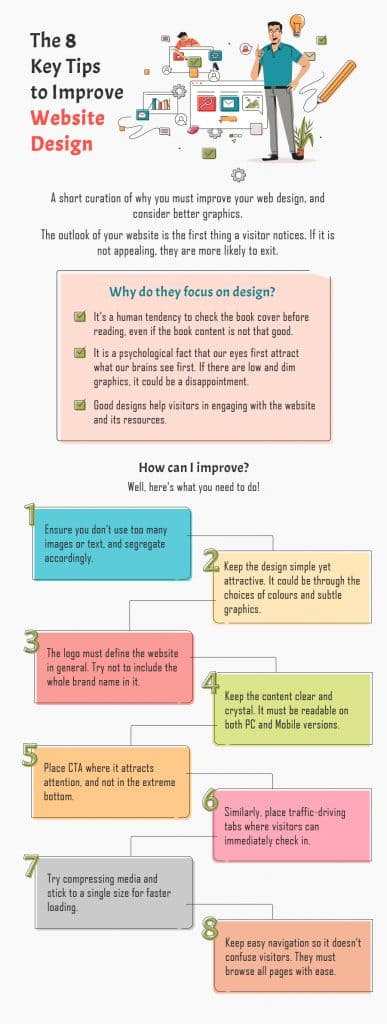When was the last time you questioned yourself that your website needs a better design? Websites are the key and prime attraction of visitors. It takes them less than a second to state whether they must browse the site or not. So if you haven’t thought about how to improve my website, you must consider going through this content.
In fact, this will help you improve the growth of your site and may encourage better sales. One of the reasons you are attracting less traffic could be a less attractive design or too much graphic, which is affecting your overall performance and growth.
If you focus on the site design and try enhancing it for better, you can produce better outcomes.
Well, you need not worry as I will help you with tips to improve your website design in a simple effective infographic. It will go from why better designs are appreciated and how you can implement them. So, consider following all the tips.
Website Design Tips for a Visual Masterpiece
- Prioritize User Experience (UX) Design: Develop intuitive navigation, a clear call to action, and an easy-to-understand layout, helping visitors to find what they are looking for.
- Embrace Responsive Design: Your website looks and functions flawlessly across devices. A responsive user interface (UI) design is crucial for a wider audience reach.
- Maintaining Visual Hierarchy: Properly use color, contrast, and spacing to guide the user’s eye towards important website elements. It helps visitors to understand the key messages and actions quickly.
- Use High-Quality Visuals: A site’s images, videos and graphics should be relevant and of high quality. Adding such visuals to your site will increase engagement and effectiveness of the site.
- Ensure Fast Loading Speeds: All users of the site expect the pages to load quickly. Friendly user experience is achieved by compressing images, meeting codes, and using caching. Fast loading pages result to better retention of visitors as well as improving the rank during search engine queries.
- To Declutter and Simplify: Using images and texts that are to the point will go a long way in ensuring better engagement and focus from visitors. Avoid overwhelming visitors as this could lead to losses. Use of whitespace and keeping texts to a minimum will boost focus while improving readability.
Tips to Improve Your Website Quality
1. Content Depth and Comprehensiveness
Make sure your content covers the topic fully, answers common user questions, and includes all the important details. Google favors content that truly matches what users are looking for, not just content that touches the topic lightly.
2. Content Freshness and Regular Updates
Regularly reviewing and updating the existing content to ensure its accuracy, relevance, and adding new insights. This signals to search engines that your site is active and provides up-to-date information.
3. E-E-A-T (Experience, Expertise, Authoritativeness, Trustworthiness)
Google emphasizes the EEAT guidelines. Individuals must demonstrate experience and expertise in the subject matter. Every published content should be authoritative and trustworthy. It means you are having a clear author bio, citing reputable sources, and building a strong reputation for the domain and content creators.
4. User Engagement and Interaction
The content should encourage user engagement. It includes interactive elements, comments, and CTAs (Call to Action). Higher KPIs for engagement (lower bounce rates and more) signal search engines that your content is valuable to users.
5. Content Diversity
Incorporate several multimedia elements like videos, infographics, audio, and interactive tools. Go beyond texts and static images to make content more engaging. It caters to different learning styles and improves time on page. Ensure all multimedia for website optimization is perfect for fast loading and accessibility.
6. Originality and Uniqueness
Emphasize original content. Do not plagiarize content from other resources or from yourself (even your other pages). Search engines value unique content as it helps to establish you as an authority. In the case of similar subjects, use different perspectives or provide greater depth.

In the end, I would suggest you analyze your website and improve accordingly. User experience is essential, after all!
FAQs
How does website design impact my SEO?
Good website design enhances user experience and technical performance, which are key ranking factors for search engines like Google.
What are the most common mistakes in website design to avoid?
Common mistakes include slow loading times, non-responsive layouts, complex navigation, excessive pop-ups, and poor content readability.
How often should I update or redesign my website?
You should update your website regularly with fresh content and typically consider a redesign every 2-3 years, or when technology, trends, or your business goals significantly change.
What is “responsive design” and why is it important for my website?
Responsive design ensures your website adapts and displays optimally across all devices (desktops, tablets, mobiles), which is crucial for user experience and better search engine rankings (especially with mobile-first indexing).















